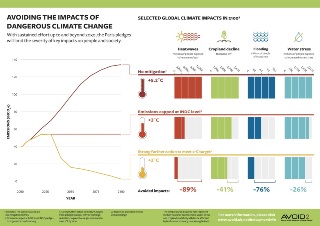Pledges to cut greenhouse gas emissions 'not enough to avoid damaging impacts'
Release Date 11 March 2016

This is the conclusion of a major research project for the UK Government which draws to a close this month, and in which the University's Walker Institute was a key partner.
The AVOID programme, funded by the UK Government and the Natural Environment Research Council, was designed to guide the UK's input to the UN climate negotiations which reached an historic global agreement back in December 2015 in Paris.
The programme as a whole looked at three key areas:
- What are the characteristics of ‘dangerous' climate change?
- What greenhouse gas emissions pathways will avoid ‘dangerous' climate change?
- What is the feasibility of such pathways?
The Walker Institute's contribution, led by Prof Nigel Arnell, a Professor of Climate Science in the University's Department of Meteorology, focussed on investigating the impacts of climate change and the extent to which impacts are lessened by reductions in greenhouse gas emissions.
Professor Arnell has investigated the impacts on water resources, flooding, heatwaves and crop production at different levels of global temperature rise: 2 degrees, 3 degrees and 5 degrees (above pre-industrial levels).
The emission pledges made by countries around the world, ahead of the Paris conference, would lead to a likely temperature rise of around 3 degrees. The new global deal agreed in Paris aims to keep temperature rise to well below 2 degrees and to try and keep temperature rise as low as 1.5 degrees (above pre-industrial levels).
However, even if global temperature rise is kept to 2 degrees, significant impacts on crops and water availability are likely. 1.5 billion people could be at risk of increased water stress and 4 million hectares of land could become less suitable for crop production, that represents only a 30-40% reduction in the impacts faced under 5 degrees of warming. Flooding and heatwaves however, are reduced by 80-90% in a 2 degree warmer world, compared with 5 degrees of warming.
'We've shown that a world with 2 degrees of warming will still suffer from the impacts of climate change' -- Professor Nigel Arnell
Professor Arnell said: "The Walker Institute's contribution to the AVOIDing Dangerous Climate Change Programme has been vital. This research from Reading played a key role in guiding the UK and other countries in the run-up to the major UN Climate Summit in Paris in December 2015 where a new global climate deal was agreed.
We've shown how important it is to reduce greenhouse gas emissions, but also, just as importantly, we've shown that a world with 2 degrees of warming will still suffer from the impacts of climate change, particularly on food and water security. The work highlights where more adaptation might be needed to cope with the effects of climate change that can't be avoided even with stringent cuts in emissions."
AVOID 2 is a UK government funded climate change research programme involving a multi-disciplinary consortium of UK research organisations. The programme ran from February 2014 to March 2016. It followed on from the first AVOID programme which took place from 2009 to 2013.
The research being undertaken provided scientifically-robust, policy-relevant answers to questions directly related to the Ultimate Objective of the UN Framework Convention on Climate Change (UNFCCC), which is to ‘prevent dangerous anthropogenic interference with the climate system'.
The multi-disciplinary consortium is led by the Met Office and includes the Grantham Institute (Imperial College London), Tyndall Centre for Climate Change Research, and Walker Institute (University of Reading). There are 12 other organisations in the AVOID network.
